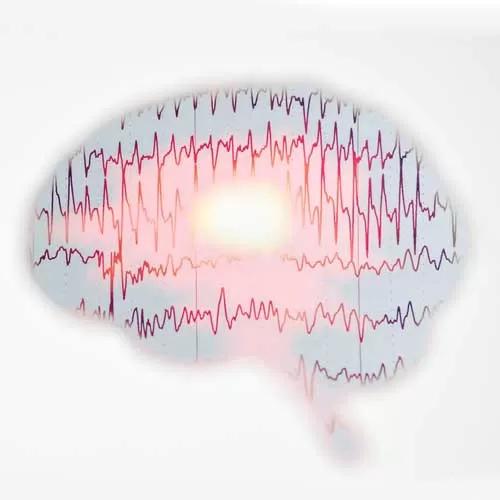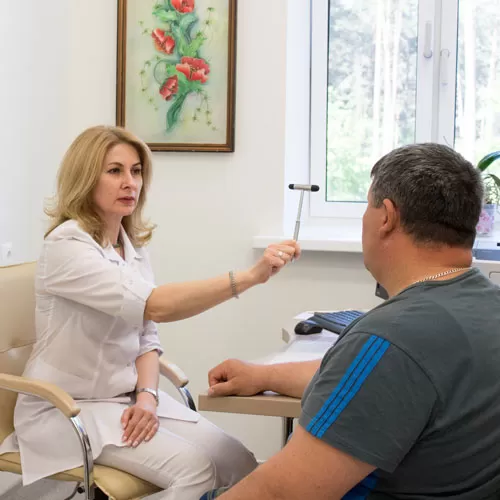
The Sleep Office, part of the Neurology Department of the RCMC, is outfitted with the most advanced diagnostic and therapeutic equipment of the leading international manufacturers.
INDICATIONS FOR POLYSOMNOGRAPHIC TESTING
Sleep has an important impact on general state, perception-reaction time, alertness and performance. Good sleep improves physical and mental health and improves life quality and expectancy. Sleeping disorders are widespread and may have various symptoms. Clinical studies convincingly demonstrate that sleeping disorders not only degrade the quality of life, but are also often accompanied by the development of arterial hypertension, arrhythmia, cerebral accidents, type 2 diabetes and the metabolic syndrome followed by excessive weight gain.
THE PROCEDURE OF THE TEST
At the Sleep Laboratory, we perform polysomnographic studies that are followed by an examination in the Center (depending on the revealed pathology) and the development of a treatment plan.
We offer various therapy programs performed at the Sleep Laboratory following a free-of-charge somnologist’s consultation:
- Diagnosis and selection of sleep disorder therapy;
- Selection of therapy of breathing troubles associated with sleep disorders;
- Comprehensive diagnostics of sleep-disordered breathing at the European level:
Comprehensive Diagnosis Program No. 1 (basic)
Basic examination when obstructive sleep apnoea syndrome is suspected
- Somnologist's consultation;
- Polysomnography or respiratory monitoring;
- Spirometry (assessment of volume and velocity characteristics of breathing);
- Electrocardiography;
- Therapeutist’s consultation;
- A suite of laboratory tests;
- Consultation of an ENT specialist (in cases of upper respiratory passage pathologies);
Comprehensive Diagnosis Program No. 2 (basic)
Diagnostics of sleeping disorders and overall state of the body;
- Somnologist's consultation;
- Polysomnography or respiratory monitoring;
- Spirometry (assessment of volume and velocity characteristics of breathing);
- Electrocardiography;
- Ultrasound of the heart.
- Therapeutist’s (cardiologist’s) consultation;
- A suite of laboratory tests to evaluate the risk of atherosclerosis, cardiovascular pathologies, diabetes mellitus and thyroid gland pathologies;
- ENT specialist’s consultation (URP pathologies);
- Thyroid gland ultrasonography;
- Endocrinologist's consultation.
Comprehensive Diagnosis Program No. 3 (basic)
Advanced diagnostics of sleeping disorders, breath disorders and cardiovascular pathologies (coronary heart disease, heart rhythm abnormalities, cardiac insufficiency, hypertensive disease);
- Somnologist's consultation;
- Polysomnography or respiratory monitoring;
- Spirometry (assessment of volume and velocity characteristics of breathing);
- Electrocardiography;
- Ultrasound of the heart.
- Holter monitoring;
- Brachiocephalic artery ultrasonography;
- Physical exercise tests (treadmill tests);
- Cardiologist's consultation (to eliminate any cardiology factors);
- A suite of laboratory tests to assess the risk of development of atherosclerosis, health condition and diabetes mellitus;
- Thyroid gland ultrasonography;
- Endocrinologist's consultation;
- ENT specialist’s consultation.
Comprehensive Diagnosis Program No. 4 (basic)
Advanced diagnostics of sleeping disorders, breath disorders and cerebrovascular pathologies (chronic cerebrovascular insufficiency, discirculatory encephalopathy, paroxysmal states, epilepsy, parasomnia);
- Somnologist's consultation;
- Polysomnography or respiratory monitoring;
- EEG;
- ECG;
- Brain MRT;
- MRT and angiography of cerebral vessels;
- Brachiocephalic artery ultrasonography;
- Physical exercise tests (threadmill tests);
- Neurologist's consultation;
- A suite of laboratory tests to assess the risk of development of atherosclerosis or cerebrovascular pathologies;
- Psychotherapist's consultation.
Comprehensive Diagnosis Program No. 5 (basic)
Advanced diagnostics of sleeping breath disorders and visual impairments (chronic cerebrovascular insufficiency, glaucoma, retina pathologies, cataract)
- Somnologist's consultation;
- Polysomnography or respiratory monitoring;
- Electrocardiography;
- Brain MRT;
- Brachiocephalic artery ultrasonography;
- Computer-assisted vision disorder diagnosis;
- Fundus lens examination;
- Eye care specialist’s consultation;
- A suite of laboratory tests to assess the risk of development of atherosclerosis or cerebrovascular pathologies;
- Neurologist's consultation.
Comprehensive Diagnosis Program No. 6 (basic)
Advanced diagnostics insomnia
- Somnologist's consultation;
- Polysomnography;
- Electrocardiography;
- Brain MRT;
- A suite of laboratory tests to assess the risk of development of atherosclerosis or cerebrovascular pathologies;
- Psychotherapist's consultation.
Diagnostics of daytime sleepiness and narcolepsy (MSLT test);
Multiple latency sleep test is performed in cases of increased daytime sleepiness for quantitative assessment of the time needed to fall asleep. Pathologic somnolence is marked by an average sleep latency of less than 5 minutes. Pathological narcolepsy is manifested by low latency during the REM. An objective study of daytime sleepiness is also recommended to individuals that have flexible work time and shift-based working hours. MSLT test (multiple sleep latency test) consists of several daytime sleep sessions at two-hour intervals, and is intended to establish the degree of daytime sleepiness.
The test starts at 9:00 and and lasts until 14:00 or 16:00.
Insomnia Treatment Program
The patient stays at the Sleep Laboratory for the duration of the seven-day diagnostic and therapy program. The program starts with a comprehensive examination of the patient aimed at the clarification of the cause of insomnia. After that, one of diagnostic procedures is performed, following a consultation with the somnologist. Following the results of the examination, a conference of specialists is held to develop an individual treatment tactic.
The ANTISTRESS Program
The patient stays at the Sleep Laboratory for a ten-day diagnostic and therapy program. The program starts with a comprehensive examination of the patient aimed at the clarification of the cause of insomnia. After that, one of diagnostic procedures is performed, following a consultation with the somnologist. Following the examination, a conference of specialists (a therapeutist (cardiologiest), a neurologist, a primary care physician, a physiotherapy specialist and a dermatologist/esthetician) is held to develop an individual treatment tactic.
The Cognitive and Behavioral Therapy Program
Cognitive and behavioral therapy is an effective and safe method of treatment of sleep disorders (mainly insomnia of various types) where pharmacological therapy is compensated by psychotherapy sessions.
Cognitive and behavioral therapy is intended to alter your attitude towards sleep and act upon your way of life in such a way so as to enable you change your sleeping routine smoothly and establish a suitable individual daily regimen. Our specialists will perform an assessment of your sleep focusing specifically on sleep hygiene. You may be asked to keep a sleep diary (fill a special form). During therapy sessions, your awareness of whether your attitude to sleep is sound, evaluate, what aspects are improper, and how insomnia affects your way of life will be enhanced. We will help you overcome difficulties with falling asleep and sleep maintenance through the night.
Cognitive and behavior therapy has a long-lasting effect, and helps to solve your painful sleep problems.
Our specialists have an extensive experience of managing patients affected by such disorders, and they would do everything in their power to improve your behavioral habits and improve your sleep.
HOW DO I DO A POLYSOMNOGRAPHY EXAMINATION AT THE SLEEP LABORATORY?
- First, you need to consult our neurology specialist. Her name is Natalia Mikhailovna Chechik, Ph.D. (Medicine) This can be done during her consulting hours: Mondays and Wednesdays, 13:00 to 14:00 (please make a reservation through the Contact Center).
- During the diagnostic examination or a diagnostic and therapeutic procedure, the patient is required to pay food and lodging costs.




